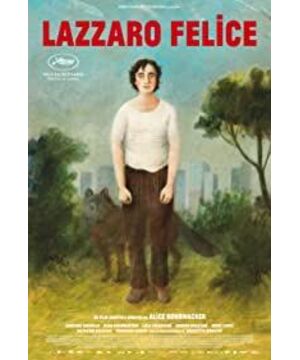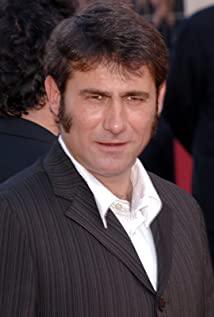In reality, from the most remote villages in the deep mountains of the Apennine to a metropolis like Milan, it is possible to reach within two days through the developed transportation network. The movie "Happy Lazzaro", however, subtly faked a serf society Inviolata (Inviolata), which was still growing tobacco for the countess at the end of the 20th century. This village, which means "untouchable", is an unknown village. There are pure peach blossoms in the Wei and Jin Dynasties, except for the ignorant villagers who are deceived and work all day as the private property of the countess, only the occasional wolf howl echoes in the valley.
According to legend, the eternal city of Rome was born out of the "wolves' milk baby". In the middle of the movie, the wolf of the Apennine, who had only heard its voice but did not see its shape, quietly approached Lazaro who fell into the valley of Invorata... The one who suddenly entered the play with the she-wolf, and the one who accompanied the deep mountain green valley Voice-over story.
"An old wolf was driven out of the wolf pack because of his old age. It was very hungry and went to the human house to eat chickens and ducks. Humans hate this ferocious wolf, but they don't know that it is just a weak wolf. The story of the old wolf In the ears of a saint who had the ability to communicate with animals, he accepted the people's request - to negotiate peace with the wolf. The saint set out to search for the wolf, traveled a long way, winter came, exhausted, but still could not find it The wolf's trail. The wolf was hungry too, and had been following the saint for a long time. Finally, one day, the saint fell, and the wolf finally appeared. Just as he was about to eat the saint, the wolf suddenly smelled a smell that had never been seen before. The smell stopped him, the smell of a good man."
At the end of the movie, the wolf approaches Lazaro again. This time, the peasant who entered the city, whose eyes were so pure that there was no trace of impurities, was lying in the bank lobby, being served by angry depositors.
"Happy Lazzaro", with bizarre background settings, outstanding characters, comfortable narrative rhythm and just right magical scenes, creates a contemporary Jesus who sacrifices himself to achieve great love, and uses his journey from deep mountains to cities. Traveling through time and space, accompanied by the fable of the foolish saint and the wolf, it tells the story of the journey of a saint who survived all evil and died in contemporary life with extreme warmth and compassion.
The background of the times presented at the beginning of the film may be a little confusing. The dilapidated villages isolated from the world without even electric lights, the poor villagers harvesting grain in the fields, and the countess’s arrogance to the serfs who grow tobacco after the arrival of the countess, this is obviously like the southern mountainous area where humans and animals live together in the 19th world; Di came with the earl's mother, but was wearing a trendy coat, playing with a mobile phone with an antenna, and walking in the mountains with a cassette player and playing the songs of the times. This is destined to be a typical appearance at the end of the 20th century. As the plot unfolds, we only know that the director has carefully set up a Peach Blossom Garden in Apennine who does not know Wei and Jin. The so-called countess has lied to the villagers for decades, making them believe that she lives in a feudal city-state and is a lady. private property, and donate agricultural products to it for free.
The setting of the scene outside the civilized domain has created a reasonable condition for the protagonist Lazaro to be indisputable in the world. In addition, the actor's pure and clean appearance makes a contemporary foolish sage who is like a flying fairy from heaven. Lazzaro, a villager who does not know who is his own parents, obviously fits the characteristics of Jesus who was born through Maria's belly, and the boy Tancred, who hid in the cave and pretended to be kidnapped, was fortunately and unfortunately to become Laza Luo's first disciple. This contemporary Jesus, after falling to the bottom of the valley and coming out of the mountain again, did not change his appearance at all, while the former neighbors of the village had grown up or aged. The former friend Antonia turned out to be a beautiful female wanderer, using Lazaro's "what clear and innocent eyes" to go to the flea market in the big city to get some necessary living expenses. Adriano Tardiolo, who played Lazzaro, was spotted in a middle school during the casting stage of the cast and insisted on letting him join it. That's it, an amateur with no acting experience, shaped the role. A classic image that will go down in film history forever.
From the soothing rural landscape to the hustle and bustle of the city, the plot develops at the most engaging rhythm. After the fable of the voice-over wolf was finished, in the blink of an eye, the serf turned over and became a homeless in Chengdu. The second generation of landlords was abused by the bank as a poor in Chengdu. Only Lazaro, who fell into the deep valley, remained simple and young. On a freezing rainy day, he walked to the dirty big city of Milan without any complaints or conflicts, just like his reunion neighbors. He was content with reality and walked around.
Young Lazaro meets Tancredi, a boy with white hair on a dance floor. This time-traveled friendship is vulnerable in the face of bad reality, and the deception of the nobles is inherited from generation to generation. The choir in the church rehearsal did not welcome urban refugees to wash their souls, but the chant slipped out of the church and lingered on Lazaro's head, invisibly but vocally crowning this contemporary Jesus. A soothing and magical legend, gradually descending into a doomed tragedy.
There are countless film works that use or borrow Bible stories, but most of them are always confusing to outsiders, unable to grasp whether the director wants to satirize or sing praises, or even completely unable to enter the narrative system of self-isolation from the audience. The female director of "Happy Lazzaro", Aliche Rohrwacher, put aside the concept first, and solidly compiled a moving story that will be very exciting even if you are separated from the religious background. Compared with the one that appeared at the 2014 Cannes Film Festival The previous work "Miracle", magical images such as the chant that escaped from the church, the wolf smelling the good man's scent, etc., finally really serve the narrative, instead of trying to bury the interpretation level for a very individual audience, which not only ensures the smoothness of the story The degree has not sacrificed the author's expressive desire in the slightest.
Armed with the "weapon" of class confrontation - the slingshot, Lazaro walked into the banking business hall he had never contacted with an innocent face, trying to get the counter to return the money to the fallen fake noble, his only friend and Disciple Tancredi. The changes of the times and the subversion of classes have never let the sinister and brutality of the world die out. The director did not really satirize the powerlessness of the pure and foolish saint in the contemporary era, but used a warm tone to make the audience move and cry with such innocent eyes on the screen.
View more about Happy as Lazzaro reviews









